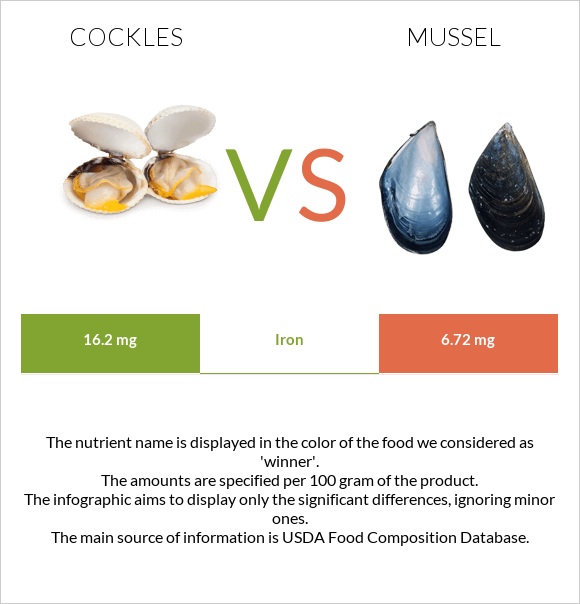Cockles vs. Mussels — In-Depth Nutrition Comparison
Compare
Summary of differences between cockles and mussels
- Cockles have more iron; however, mussels is higher in vitamin B1 and vitamin B2.
- Cockles cover your daily need for iron, 119% more than mussels.
These are the specific foods used in this comparison Cockles, raw (Alaska Native) and Mollusks, mussel, blue, cooked, moist heat.
Infographic

Infographic link
Mineral Comparison
Mineral comparison score is based on the number of minerals by which one or the other food is richer. The "coverage" charts below show how much of the daily needs can be covered by 300 grams of the food.
| Contains more IronIron | +141.1% |
| Contains less SodiumSodium | -100% |
Vitamin Comparison
Vitamin comparison score is based on the number of vitamins by which one or the other food is richer. The "coverage" charts below show how much of the daily needs can be covered by 300 grams of the food.
| Contains more Vitamin B1Vitamin B1 | +2900% |
| Contains more Vitamin B2Vitamin B2 | +110% |
All nutrients comparison - raw data values
| Nutrient |  |
 |
DV% diff. |
| Vitamin B12 | 24µg | 1000% | |
| Manganese | 6.8mg | 296% | |
| Selenium | 89.6µg | 163% | |
| Iron | 16.2mg | 6.72mg | 119% |
| Phosphorus | 285mg | 41% | |
| Zinc | 2.67mg | 24% | |
| Vitamin B1 | 0.01mg | 0.3mg | 24% |
| Protein | 13.5g | 23.8g | 21% |
| Cholesterol | 56mg | 19% | |
| Vitamin B5 | 0.95mg | 19% | |
| Folate | 76µg | 19% | |
| Copper | 0.149mg | 17% | |
| Vitamin B2 | 0.2mg | 0.42mg | 17% |
| Sodium | 369mg | 16% | |
| Vitamin C | 13.6mg | 15% | |
| Vitamin A | 91µg | 10% | |
| Magnesium | 37mg | 9% | |
| Potassium | 268mg | 8% | |
| Vitamin B6 | 0.1mg | 8% | |
| Polyunsaturated fat | 1.212g | 8% | |
| Fats | 0.7g | 4.48g | 6% |
| Calories | 79kcal | 172kcal | 5% |
| Saturated fat | 0.85g | 4% | |
| Monounsaturated fat | 1.014g | 3% | |
| Carbs | 4.7g | 7.39g | 1% |
| Vitamin B3 | 3.2mg | 3mg | 1% |
| Net carbs | 4.7g | 7.39g | N/A |
| Calcium | 30mg | 33mg | 0% |
| Tryptophan | 0.267mg | 0% | |
| Threonine | 1.025mg | 0% | |
| Isoleucine | 1.036mg | 0% | |
| Leucine | 1.676mg | 0% | |
| Lysine | 1.779mg | 0% | |
| Methionine | 0.537mg | 0% | |
| Phenylalanine | 0.853mg | 0% | |
| Valine | 1.04mg | 0% | |
| Histidine | 0.457mg | 0% | |
| Omega-3 - EPA | 0.276g | N/A | |
| Omega-3 - DHA | 0.506g | N/A | |
| Omega-3 - DPA | 0.044g | N/A |
Macronutrient Comparison
Macronutrient breakdown side-by-side comparison
| Contains more WaterWater | +28.9% |
| Contains more ProteinProtein | +76.3% |
| Contains more FatsFats | +540% |
| Contains more CarbsCarbs | +57.2% |
| Contains more OtherOther | +38.3% |



